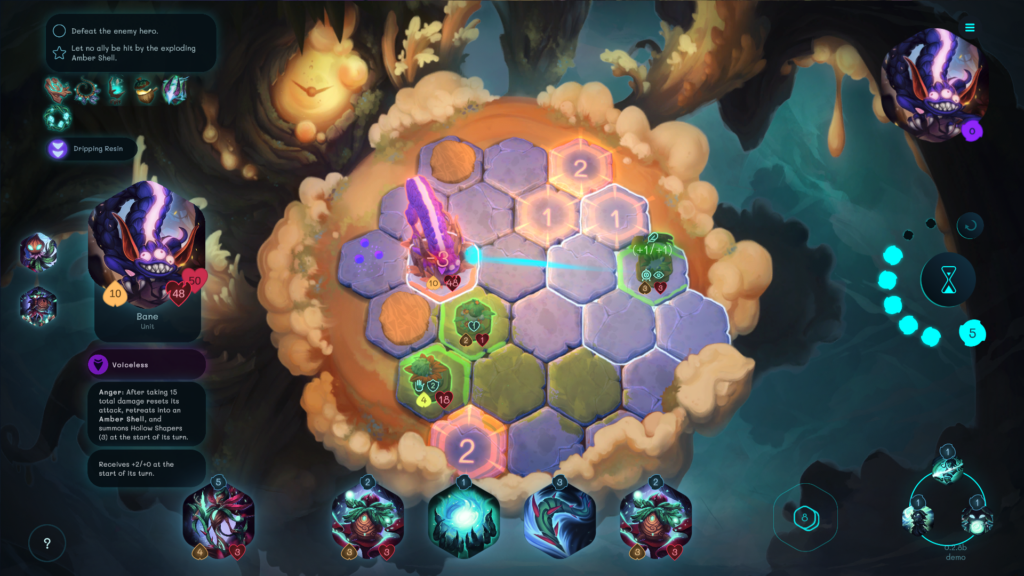As someone incredibly well versed in the iterative process of slowly getting better, accumulating knowledge and resources in an endless loop with an equally endless drive, I hear the word roguelike, I put down whatever I’m doing, adjust my glasses, and approach my Steam Library with a deliberate aura. There’s probably a word for the exact phenomenal that constantly draws roguelike fans into yet another roguelike in an endless external meta loop that exists outside of each internal meta loop, but today we’re talking details about the latest game developer Laki Studios and publisher Goblinz Publishing: Oaken.
Oaken has been in early access for the past month, and I’ve been spending odd hours acclimating myself to the beautifully designed beta. Right from the start up screen, Oaken dazzles with striking audiovisual design. The tree inspired character designed are absolutely striking, and the game exudes a brilliantly dark fantasy aesthetic, where the characters are vibrant beacons in a bleak world.
Once I started the tutorial, I was introduced to the first playable character, the Lady, and my adventures towards the Great Oak began as I attempted to get acclimated with yet another roguelike system.
Oaken has a unique hybrid approach to the gameplay. There is the expected biome pathing, where you get to choose whether to engage in skirmishes for different levels of rewards, challenge elite units in an attempt for more coveted prizes, recoup at rest sites, and learn more about the world through secrets and events culminating in a boss fight that will allow to progress to the next world. However, the battle system effectively blends various components to create a bespoke experience that feels a lot more cerebral than other roguelikes I’ve played thus far.
The bulk of the game is managing combat on a hexagonal grid. You have your hero character, which comes equipped with a set of cantrip like effects they can utilize from their placement on the deck. You have your deck, which contains both minions and companions you can summon onto the field, as well as a spread of spells. And your deck is partly influenced by your guide, who you can eventually summon to combat to evoke powerful effects.
It sounds like a lot, and it is; however, Oaken eases you with in its great tutorial. While it took a while to get used to the finesse of the controls, after a couple runs I was intuitively navigating the field. This was a good thing, because most of my mental processing was taken up trying to figure out how to win the fight and complete the secondary objects.
More than anything, Oaken is a game of foresight. Each piece on the hexagonal board has an arc that represents its defensive posture and line of sight. Knowing exactly where to place your units and where to face them is crucial because in the early onset, you’re only going to get to move the character one hex and the direction they’re facing. This creates opportunities to outmaneuver enemies to eliminate targets without taking a scratch or to fortify key positions on the field. All of this is critical because as you play cards they become unstable. But while you can play them a second time, it will essentially exhaust itself out of your deck until you get a chance to rest.
To wit, the game does an incredible job of making you considerate of all your resources in relationship to other another. Is your hero’s max HP worth getting upgrade orbs to make your individual cards more powerful? Is a potentially more impactful, but more expensive skill worth getting rid of your cheaper utility effects? Is the completion of the bonus objective worth pushing your deck pasts its limits for the next encounter? Oaken is incredible fair with the trade offs and questions it presents to you.
And to reiterate, my first impression of the game is that it looks, sounds, and plays incredibly well. The game is gorgeous, the music is spot on, the gameplay while a tad slower than my usual tastes feels satisfying as you learn to master it. Crucially, while I can see all of Oaken‘s influences, it feels like its own game. There are plenty of innovations and clever recombinations of the familiar that make it a fun experience.
The Oaken Demo is out there on Steam for you to test the waters yourself, but I think you’ll find yourself outright buying the game in short order if you’re a fan of the genre. I know I will be tinkering with it for a while.
Want to get Black Nerd Problems updates sent directly to you? Sign up here! Follow us on Twitter, Facebook, Youtube, and Instagram!





Show Comments